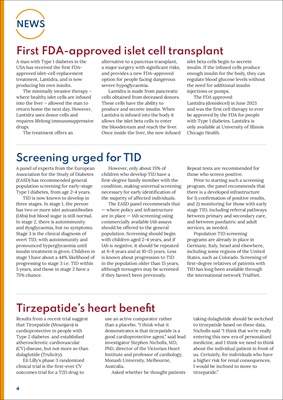
4
NEWS
First FDA-approved islet cell transplant
A man with Type 1 diabetes in the
USA has received the first FDAapproved
islet-cell replacement
treatment, Lantidra, and is now
producing his own insulin.
The minimally invasive therapy -
where healthy islet cells are infused
into the liver - allowed the man to
return home the next day. However,
Lantidra uses donor cells and
requires lifelong immunosuppressive
drugs.
The treatment offers an
alternative to a pancreas transplant,
a major surgery with significant risks,
and provides a new FDA-approved
option for people facing dangerous
severe hypoglycaemia.
Lantidra is made from pancreatic
cells obtained from deceased donors.
These cells have the ability to
produce and secrete insulin. When
Lantidra is infused into the body it
allows the islet beta cells to enter
the bloodstream and reach the liver.
Once inside the liver, the new infused
islet beta cells begin to secrete
insulin. If the infused cells produce
enough insulin for the body, they can
regulate blood glucose levels without
the need for additional insulin
injections or pumps.
The FDA approved
Lantidra (donislecel) in June 2023
and was the first cell therapy to ever
be approved by the FDA for people
with Type 1 diabetes. Lantidra is
only available at University of Illinois
Chicago Health.
Screening urged for T1D
A panel of experts from the European
Association for the Study of Diabetes
(EASD) has recommended general
population screening for early-stage
Type 1 diabetes, beginning at age 2-4
years.
T1D is now known to develop in
three stages. In stage 1, the person
has two or more islet autoantibodies
(IAbs) but blood sugar is still normal.
In stage 2, there is autoimmunity
and dysglycaemia, but no symptoms.
Stage 3 is the clinical diagnosis of
overt T1D, with autoimmunity and
pronounced hyperglycaemia until
insulin treatment is given. Children in
stage 1 have about a 44% likelihood of
progressing to stage 3 i.e. T1D within
5 years, and those in stage 2 have a
75% chance.
However, only about 15% of
children who develop T1D have a
first-degree family member with the
condition, making universal screening
necessary for early identification of
the majority of affected individuals.
The EASD panel recommends that
- where policy and infrastructure
are in place - IAb screening using
commercially available IAb assays
should be offered to the general
population. Screening should begin
with children aged 2-4 years, and if
IAb is negative, it should be repeated
at 6-8 years and at 10-15 years. Less
is known about progression to T1D
in the population older than 15 years,
although teenagers may be screened
if they haven't been previously.
Repeat tests are recommended for
those who screen positive.
Prior to starting such a screening
program, the panel recommends that
there is a developed infrastructure
for 1) confirmation of positive results,
and 2) monitoring for those with early
stage T1D, including referral pathways
between primary and secondary care,
and between paediatric and adult
services, as needed.
Population T1D screening
programs are already in place in
Germany, Italy, Israel and elsewhere,
including some regions of the United
States, such as Colorado. Screening of
first-degree relatives of patients with
T1D has long been available through
the international network TrialNet.
To find out more, CLICK HERE.
Tirzepatide's heart benefit
Results from a recent trial suggest
that Tirzepatide (Mounjaro) is
cardioprotective in people with
Type 2 diabetes and established
atherosclerotic cardiovascular
(CV) disease, but not more so than
dulaglutide (Trulicity).
Eli Lilly's phase 3 randomized
clinical trial is the first-ever CV
outcomes trial for a T2D drug to
use an active comparator rather
than a placebo. "I think what it
demonstrates is that tirzepatide is a
good cardioprotective agent," said lead
investigator Stephen Nicholls, MD,
PhD, director of the Victorian Heart
Institute and professor of cardiology,
Monash University, Melbourne,
Australia.
Asked whether he thought patients
taking dulaglutide should be switched
to tirzepatide based on these data,
Nicholls said "I think that we're really
entering this new era of personalized
medicine, and I think we need to think
about the individual patient in front of
us. Certainly, for individuals who have
a higher risk for renal consequences,
I would be inclined to move to
tirzepatide."